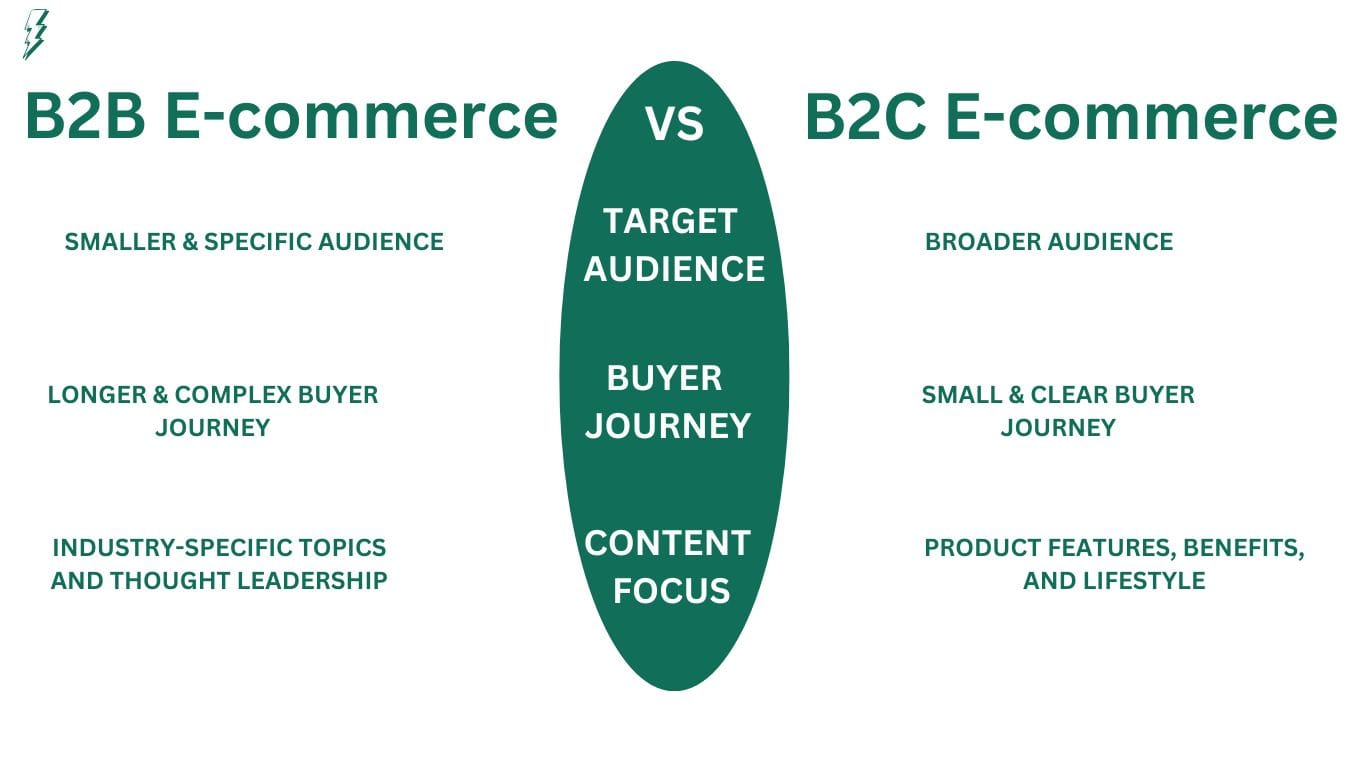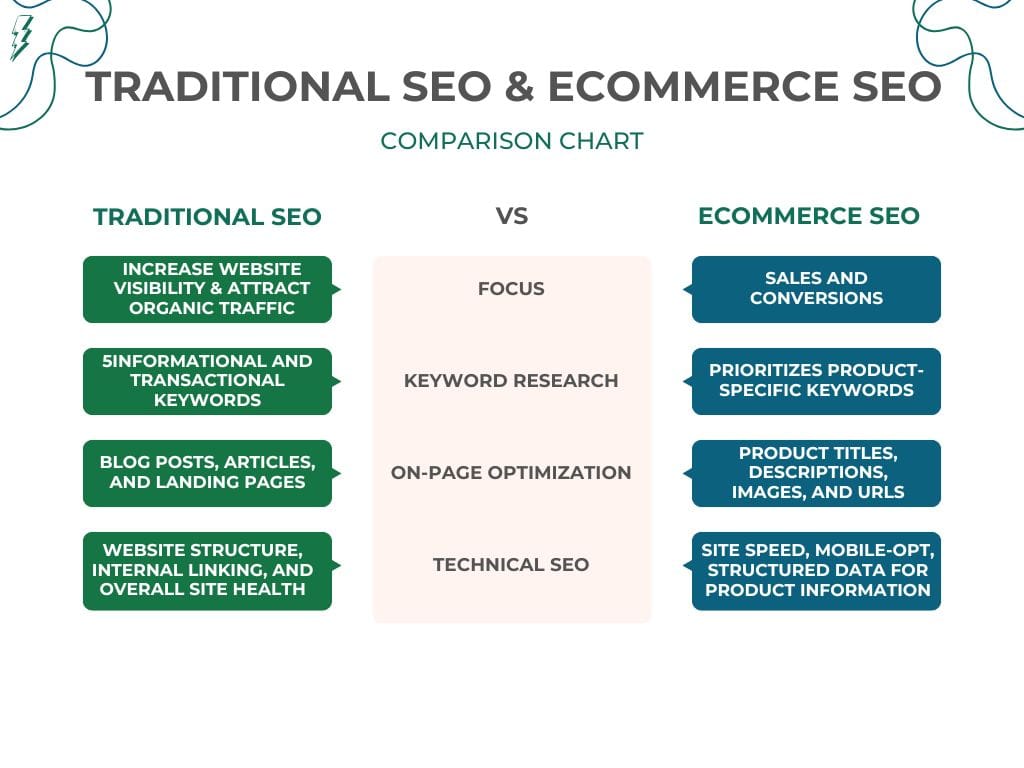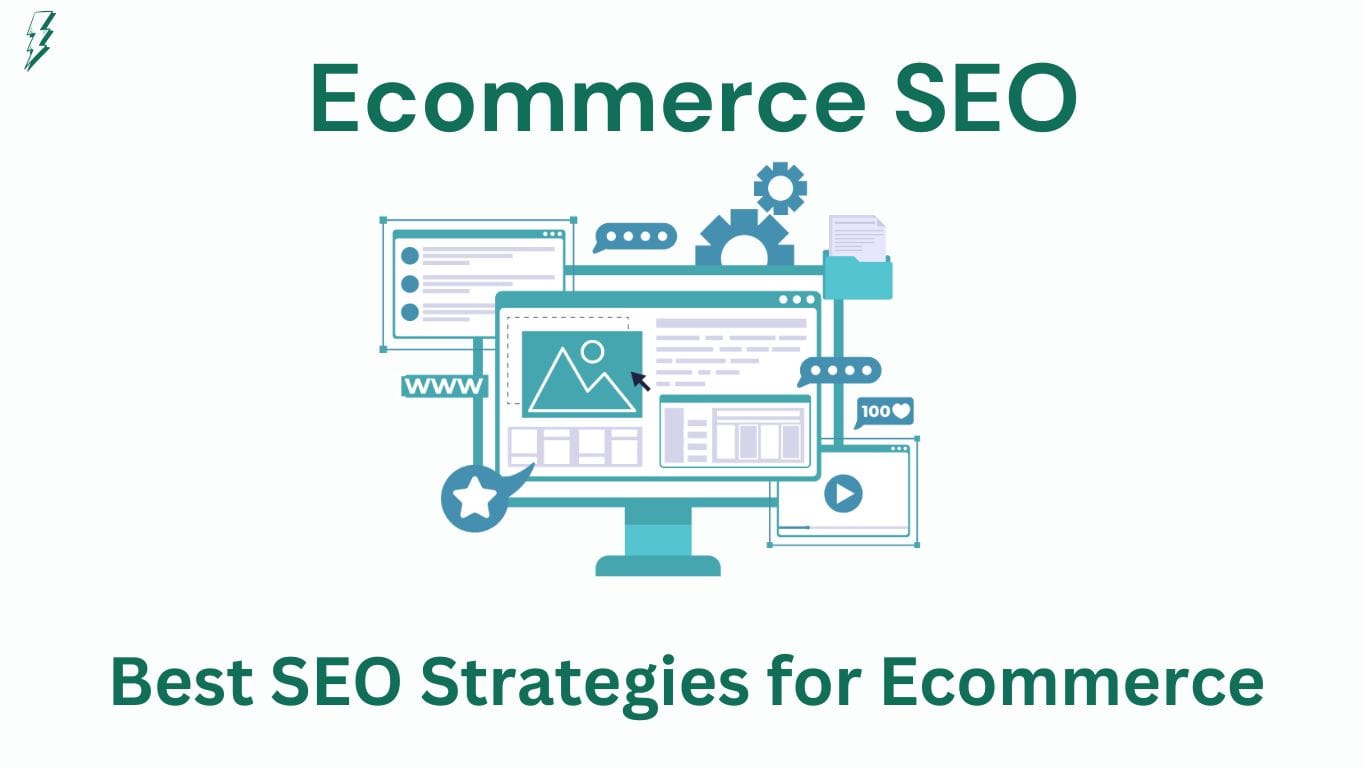Drive More Traffic and Sales: Ecommerce SEO Strategies
Ecommerce SEO is the process of optimizing an online store to improve its visibility in search engine results pages (SERPs) for relevant keywords. This involves making changes to the website’s content, structure, and technical aspects to attract more organic traffic and drive sales.
Why Is SEO Important for Ecommerce Websites?
Now a days, online shopping has become the norm, having a strong online presence is crucial for any ecommerce business. Search Engine Optimization (SEO) is the key to unlocking this potential.
By optimizing your website for search engines like Google, you can significantly increase your visibility, attract more organic traffic, and ultimately boost your sales.
How Does Ecommerce SEO Work?
Ecommerce SEO involves a multifaceted approach that focuses on improving your website’s ranking in search engine results pages (SERPs) for relevant keywords.
This includes
Keyword Research: Starting with identifying the most relevant keywords that your target audience is searching for.
On-Page Optimization: Optimizing your website’s content, including titles, meta descriptions, headers, and images, to include target keywords.
Technical SEO: Ensuring your website’s technical aspects, such as website speed, mobile-friendliness, and site structure, are optimized for search engines.
Link Building: Acquiring high-quality backlinks from other reputable websites to increase your website’s authority.
Content Marketing: Create valuable content like blog posts and product guides to attract and engage your audience.
Local SEO: Optimize your website for local search to attract customers in your specific geographic area.
Must Check: How To Build A Successful Ecommerce Marketing Store
Best SEO Strategies for Ecommerce 2025
In today’s competitive online marketplace, optimizing your ecommerce store for search engines is crucial. By implementing effective SEO strategies, you can significantly boost your visibility, attract more organic traffic and ultimately drive sales.
Let’s delve into some of the most potent SEO tactics to propel your ecommerce business forward.
Conduct In-Depth Keyword Research
The foundation of any successful SEO strategy lies in meticulous keyword research. Identify the specific keywords and phrases that your target audience is actively searching for.
Utilize tools like Google Keyword Planner, SEMrush, or Ahrefs to uncover high-volume, low-competition keywords. Prioritize keywords that align with your products and services, and incorporate them naturally into your website content.
Optimize Product Pages
Product pages are the heart of your ecommerce store. To optimize them for search engines, pay close attention to the following:
Compelling Product Titles: Craft descriptive and keyword-rich product titles that accurately reflect the product’s attributes.
Engaging Product Descriptions: Write informative and persuasive product descriptions that highlight key features and benefits.
High-Quality Images: Use high-resolution images with optimized file names and alt text.
Fast Page Load Times: Optimize images, minimize HTTP requests, and leverage browser caching to improve page load speed.
Local SEO
Local SEO is definitely helpful for ecommerce SEO, especially for businesses with physical locations or those targeting specific geographic areas.
>> Google My Business
Optimizing your Google My Business listing helps you appear in local search results, Google Maps, and Knowledge Panels.
>> Local Citations
Building citations on local directories like Yelp, Bing Places, and Yellow Pages improves your local search ranking.
Leverage the Power of Content Marketing
Content marketing is a powerful tool to attract and engage your target audience. Create high-quality, informative, and keyword-rich content, such as blog posts, articles, and product guides. This will not only help you rank higher in search engine results but also establish your brand as an industry authority.
Prioritize Mobile Optimization
With the increasing number of mobile users, optimizing your ecommerce store for mobile devices is non-negotiable. Ensure your website is responsive, loads quickly, and provides a seamless user experience on smartphones and tablets. Google’s mobile-first indexing means that mobile-friendliness is a crucial ranking factor.
Build High-Quality Backlinks
Backlinks from reputable websites can significantly boost your website’s authority and search engine rankings. Focus on building natural and relevant backlinks through guest posting, outreach, and other ethical link-building techniques.
Implement Schema Markup
Schema markup, also known as structured data, helps search engines understand the context of your website’s content. By implementing schema markup for products, reviews, and local business information, you can enhance your search engine visibility and rich snippet opportunities.
Monitor and Analyze Your SEO Performance
Regularly monitor and analyze your website’s SEO performance using tools like Google Analytics and Google Search Console. Track key metrics such as organic traffic, keyword rankings, and conversion rates.
Use these insights to identify areas for improvement and refine your SEO strategy accordingly.
Is There a Difference in Doing SEO in B2B Ecommerce vs. B2C Ecommerce?

While the fundamental principles of SEO remain consistent across B2B and B2C ecommerce, there are distinct nuances that require tailored strategies.
B2B Ecommerce
In B2B ecommerce, the target audience is primarily businesses and professionals. This necessitates a focus on industry-specific keywords, long-tail keywords, and technical jargon.
Content marketing plays a pivotal role, with a strong emphasis on thought leadership, case studies, whitepapers, and webinars. The goal is to establish credibility, build trust, and position the brand as an expert in the field.
The buyer’s journey is often longer and more complex, involving multiple decision-makers. SEO strategies must be aligned with this journey, providing valuable information and resources at each stage.
B2C Ecommerce
B2C ecommerce is primarily focused on individual consumers. The keywords tend to be more product-focused and transactional, aiming to drive immediate sales.
Content marketing often involves product reviews, blog posts, and social media engagement to create a strong brand image and customer connection.
The buyer’s journey is typically shorter, and the focus is on driving impulse purchases or fulfilling specific needs.
In essence, B2B SEO is more strategic and knowledge-driven, while B2C SEO is more tactical and consumer-focused. However, it’s important to note that the lines between the two can blur, and a successful e-commerce SEO strategy often involves a blend of both approaches.
Is There Any Difference Between Ecommerce Seo And Traditional Seo

While ecommerce SEO and traditional SEO share many similarities, they do have some key differences:
Ecommerce SEO
Focus: Primarily focused on driving sales and conversions through product pages, category pages and checkout processes.
Keyword Research: Prioritizes product-specific keywords with a strong purchase intent.
On-Page Optimization: Emphasizes optimizing product titles, descriptions, images, and URLs.
Technical SEO: Places importance on factors like site speed, mobile-friendliness, and structured data for product information.
Traditional SEO
Focus: Aims to increase website visibility and attract organic traffic through blog posts, articles, and other content.
Keyword Research: Targets a wider range of keywords, including informational and transactional keywords.
On-Page Optimization: Focuses on optimizing blog posts, articles, and landing pages.
Technical SEO: Prioritizes factors like website structure, internal linking, and overall site health.
In essence, ecommerce SEO is a specialized form of traditional SEO tailored to the unique needs of online stores. It involves optimizing every aspect of an ecommerce website to improve its search engine rankings and drive sales.
While both approaches have their own unique strategies, they often complement each other. A successful ecommerce SEO strategy will combine elements of both traditional and ecommerce SEO to maximize results.
How Long Does It Take to See Results from Ecommerce SEO?
The time it takes to see results from Ecommerce SEO can vary depending on various factors, including the competitiveness of your industry, the current state of your website, and the
intensity of your SEO efforts. However, consistent and strategic SEO efforts can start yielding results within a few months
Final Words
Ecommerce SEO is a dynamic and ever-evolving field. By implementing the strategies discussed above, you can significantly improve your website’s visibility, attract more organic traffic, and ultimately boost your online sales. Remember, SEO is a long-term investment, so be patient and consistent in your efforts.

